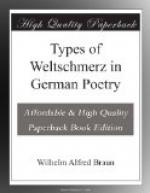This then in briefest outline is the transition from the century of individualism and autocracy to the nineteenth century of democracy. Small wonder that the struggle claimed its victims in those individuals who, unable to find a firm basis of conviction and principle, vacillated constantly between instinctive adherence to old traditions, and unreasoned inclination to the new order of things.
FOOTNOTES:
[Footnote 1: “Pessimism, a History and a Criticism,” London, 1877.]
[Footnote 2: Ed. von Hartmann: “Zur Geschichte und Begruendung des Pessimismus,” Leipzig, Hermann Haacke, p. 187.]
[Footnote 3: “Les Poetes Lyriques de l’Autriche,” Paris, 1886, p. 293.]
[Footnote 4: “Vortraege und Aufsaetze zur Geschichte des geistigen Lebens in Deutschland und Oesterreich,” Berlin, 1874, p. 413.]
[Footnote 5: Act 5, Sc. 2.]
[Footnote 6: “Goethes Werke,” Weimar ed. Vol. 28, p. 227 f.]
[Footnote 7: Ibid., p. 216 f.]
[Footnote 8: In view of Goethe’s own words, then, the caution of a recent critic (Felix Melchior in Litt. Forsch. XXVII Heft, Berlin, 1903) against applying the term Weltschmerz to “Werther,” would seem to miss the mark entirely. Werther is a type, just as truly as is Faust, though in a smaller way, and the malady which he typifies has its ultimate origin in the development of public life,—the very condition which this critic insists upon as a mark of Weltschmerz in the proper application of the term.]
[Footnote 9: “Historische und politische Aufsaetze,” Leipzig, 1897. Vol. 4.]
[Footnote 10: As early as 1797 Hoelderlin’s Hyperion laments: “Mein Geschaeft auf Erden ist aus. Ich bin voll Willens an die Arbeit gegangen, habe geblutet darueber, und die Welt um keinen Pfennig reicher gemacht.” ("Hoelderlin’s gesammelte Dichtungen, herausgegeben von B. Litzmann,” Stuttgart, Cotta, undated. Vol. II, p. 68.) Several decades later Heine writes: “Ich kann mich ueber die Siege meiner liebsten Ueberzeugungen nicht recht freuen, da sie mir gar zu viel gekostet haben. Dasselbe mag bei manchem ehrlichen Manne der Fall sein, und es traegt viel bei zu der grossen duesteren Verstimmung der Gegenwart.” (Brief vom 21 April, 1851, an Gustav Kolb; Werke, Karpeles ed. Vol. IX, p. 378.)]




